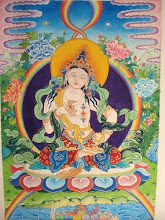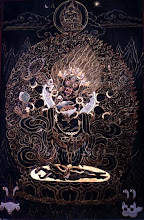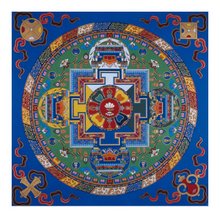 Many English accounts of the Noble Eightfold Path read like the Buddhist 10 Commandments, moral edicts handed down by the prophet of enlightenment. And that's pretty much the treatment offered in American Theravada monk Bhikku Bodhi's slim volume, a concise summary of rules for living. This book would probably be of most use to someone with little to no background in Buddhism, though anyone needing this kind of basic information might be served equally well by reading the Wikipedia entry to the Noble Eightfold Path, or any of the treatments offered at numerous Buddhist websites. Those with a foundation in the basics will find Bodhi's explication lacking in imagination or psychological depth. In fairness to the author, this book appeared quite early in his scholarly career; if he were to come back to the subject today, he might deliver a fuller, richer account.
Many English accounts of the Noble Eightfold Path read like the Buddhist 10 Commandments, moral edicts handed down by the prophet of enlightenment. And that's pretty much the treatment offered in American Theravada monk Bhikku Bodhi's slim volume, a concise summary of rules for living. This book would probably be of most use to someone with little to no background in Buddhism, though anyone needing this kind of basic information might be served equally well by reading the Wikipedia entry to the Noble Eightfold Path, or any of the treatments offered at numerous Buddhist websites. Those with a foundation in the basics will find Bodhi's explication lacking in imagination or psychological depth. In fairness to the author, this book appeared quite early in his scholarly career; if he were to come back to the subject today, he might deliver a fuller, richer account. For a more substantial treatment of the path, you might like to try the lecture series by English monk Sangharakshita. Founder of the Western Buddhist Order, Sangharakshita stayed on in India after WWII to ordain as a Theravadan monk, studied Pali and Sanskrit at Benares Hindu University, and went on to practice with Vajrayana and Chan teachers. He returned in 1966 to teach in the UK, where two years later in London he gave a weekly series of eight hourly lectures on the Noble Eightfold Path that he describes as introductory for new aspirants and a revision for those already practicing. It is perhaps the most insightful explication of the subject that I've had the pleasure to encounter, one in which Buddhism is presented as a Utopian ideal encompassing every facet of human life, not just a technique for experiencing a glimpse of ultimate reality. Generally a critical reader and circumspect in praise, it comes as something of surprise even to myself to say that this series has inspired a reevaluation of my relationship to Buddhism.
For a more substantial treatment of the path, you might like to try the lecture series by English monk Sangharakshita. Founder of the Western Buddhist Order, Sangharakshita stayed on in India after WWII to ordain as a Theravadan monk, studied Pali and Sanskrit at Benares Hindu University, and went on to practice with Vajrayana and Chan teachers. He returned in 1966 to teach in the UK, where two years later in London he gave a weekly series of eight hourly lectures on the Noble Eightfold Path that he describes as introductory for new aspirants and a revision for those already practicing. It is perhaps the most insightful explication of the subject that I've had the pleasure to encounter, one in which Buddhism is presented as a Utopian ideal encompassing every facet of human life, not just a technique for experiencing a glimpse of ultimate reality. Generally a critical reader and circumspect in praise, it comes as something of surprise even to myself to say that this series has inspired a reevaluation of my relationship to Buddhism.Sangharakshita is a witty and linguistically limber speaker, well read and able to include examples from various Buddhist traditions, as well as from English and Christian literature. He is something of a controversial figure for teachings on family and sex relations, as well as somewhat infamous for episodes of sexual impropriety and organizational mismanagement. This lecture series was conducted when Sangharakshita was just getting started in the UK and doesn't touch on any of his later controversial teachings. If you can set aside the scandal and listen with an open mind, you'll find this series intellectually rewarding. Bodhi's book in comparison is like reading a sport's rule book – all detail but no sense of the drama of the game itself.
The Sangharakshita lectures are available for download here.
#



























For beginners, I recommend Walpola Rahula's What the Buddha Taught.
ReplyDeleteIt is occasionally accused of having a slightly Theravada bias, but most scholars acknowledge and accept the authority of its sources.
It's also very readable for a beginner. For the fundamentals, I can think of nothing better, not even Wikipedia (and I love Wikipedia).
-Moon